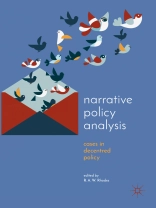Narratives or storytelling are a feature of the everyday life of all who work in government. They tell each other stories about the origins, aims and effects of policies to make sense of their world. These stories form the collective memory of a government department; a retelling of yesterday to make sense of today. This book examines policies through the eyes of the practitioners, both top-down and bottom-up; it decentres policies and policymaking. To decentre is to unpack practices as the contingent beliefs and actions of individuals. Decentred analysis produces detailed studies of people’s beliefs and practices. It challenges the idea that inexorable or impersonal forces drive politics, focusing instead on the relevant meanings, the beliefs and preferences of the people involved.
This book presents ten case studies, covering penal policy, zero-carbon homes, parliamentary scrutiny, children’s rights, obesity, pension reform, public service reform, evidence-based policing, and local economic knowledge. It introduces a different angle of vision on the policy process; it looks at it through the eyes of individual actors, not institutions. In other words, it looks at policies from the other end of the telescope. It concludes there is much to learn from a decentred approach. It delivers edification because it offers a novel alliance of interpretive theory with an ethnographic toolkit to explore policy and policymaking from the bottom-up.
Written by members of the Department of Politics and International Relations of the University of Southampton, with their collaborators at other universities, the book’s decentred approach provides an alternative to the dominant evidence–based policy nostrums of the day.
Daftar Isi
Chapter 1-What is Decentred Analysis?-R. A. W. Rhodes.- Chapter 2-What is Penal Policy? Traditions and Practices in the UK Ministry of Justice-Harry Annison.- Chapter 3-What Makes a Zero Carbon Home Zero Carbon?-Heather Lovell and Jack Corbett.- Chapter 4-What are the Hidden Dimensions to Parliamentary Scrutiny – the Ghosts in the Machine?-Tony Mc Nulty.- Chapter 5-How Are Children’s Rights (Mis) Interpreted in Practice? The European Commission, Children’s Rights and Policy Narratives-Ingi Iusmen.- Chapter 6-How Do You Go From Demonizing Adversaries to Deliberating With Them?-John Boswell.- Chapter 7-How Have Narratives, Beliefs and Practices Shaped Pension Reform in Sweden?-Karen Anderson.- Chapter 8-What are the Consequences of Incessant Reform? Losing Trust, Policy Capacity and Institutional Memory in the Queensland Core Executive-Anne Tiernan.- Chapter 9-How do Local Government Chief Executives Engage with Policy Dilemmas?-Kevin Orr and Mike Bennett.- Chapter 10-How do the Police Respond to Evidence Based Policing?-Jenny Fleming.- Chapter 11-What do UK Citizens Understand about Austerity?-Anna Killick.
Tentang Penulis
R. A. W. Rhodes is Professor of Government at the University of Southampton, UK. Previously, he was the Director of the UK Economic and Social Research Council’s ‘Whitehall Programme’ (1994-1999); Distinguished Professor of Political Science at the Australian National University (2006-11); and Director of the Research School of Social Sciences at the Australian National University (2007-8). In 2015, the ECPR awarded him its biennial Lifetime Achievement Award for his ‘outstanding contribution to all areas of political science, and the exceptional impact of his work’.












